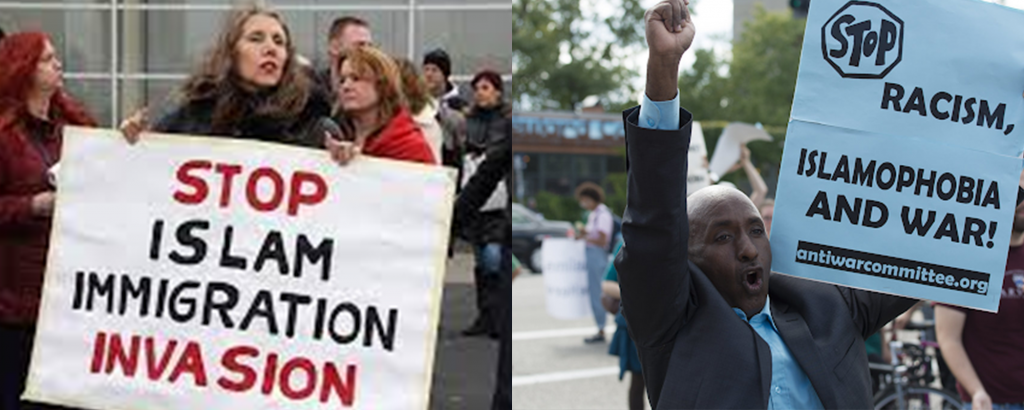
“Islamophobia Protestors,” CC/BY NDW, Anonymous, “Stop racism, Islamophobia and war” CC/BY SA 2.0, Fibonacci Blue A few weeks after the attacks of 9/11 in 2001, protesters demanded the government to stop the migration of Muslims (left). Over a decade later, protests fighting against Islamophobia have taken place, with many protestors holding signs urging for a stop to racism, Islamophobia, and war (right).
Islamophobia post 9/11
Sept. 11, 2001 was a tragic day for the U.S. and the world. The events of 9/11 killed many and yielded several long term effects, including the drastic increase of Islamophobia—the discrimination against the religion of Islam and Muslims. Twenty years after 9/11, Islamophobia is still persistent in the country and is exhibited on different levels.
One of the most common ways Islamophobia is exhibited is through assault, ranging from verbal hostility to vandalism to physical abuse. After 9/11, Muslims faced discrimination through social media and degradation. Furthermore, theft and arson targeted Muslims, as well as vandalism which symbolized Islamophobia. According to hate crime data from the Federal Bureau of Investigation, the total number of Islamophobic-motivated assaults, murders, and nonnegligent manslaughters spiked from 12 cases in 2000 to 93 in 2001. This increase in cases continued, going up to 1,062 reported hate crimes against Muslims in the U.S. over the last five years. Additionally, the rate of hate crimes began to rise, jumping from 93 in one year to averaging over 200 per year.
Due to such demeaning acts, many victims were forced to go into hiding, afraid of the country they were living in, and also decreased their involvement in politics, distancing themselves from people, including other racial minorities. However, many social activists advocated against Islamophobia, encouraging acceptance of Islam and Muslims, not their exclusion. One of the leading support groups is the Islamic Relief USA, who set up multiple charities and distributed humanitarian aid to many Islamic devotees suffering from the attacks of 9/11 and its following backlash against Muslims.
In addition to social activist organizations, the United States Department of Justice has taken and continues to take actions against Islamophobia. According to the Department of Justice Archives, “DOJ attorneys have coordinated with state and local prosecutors in numerous non-federal criminal prosecutions, in many cases providing substantial assistance.” The department has also been working on employment discrimination, educational discrimination, protecting land for religious purposes, and making public facilities more accessible for all.
Altogether, Islamophobia is still present in the world, rooted deeply among people. Despite that, the increase of Muslim acceptance in the workforce, social groups, and politics contributes to a growing awareness of Islamophobia and how to halt its future and reconcile with the victims.